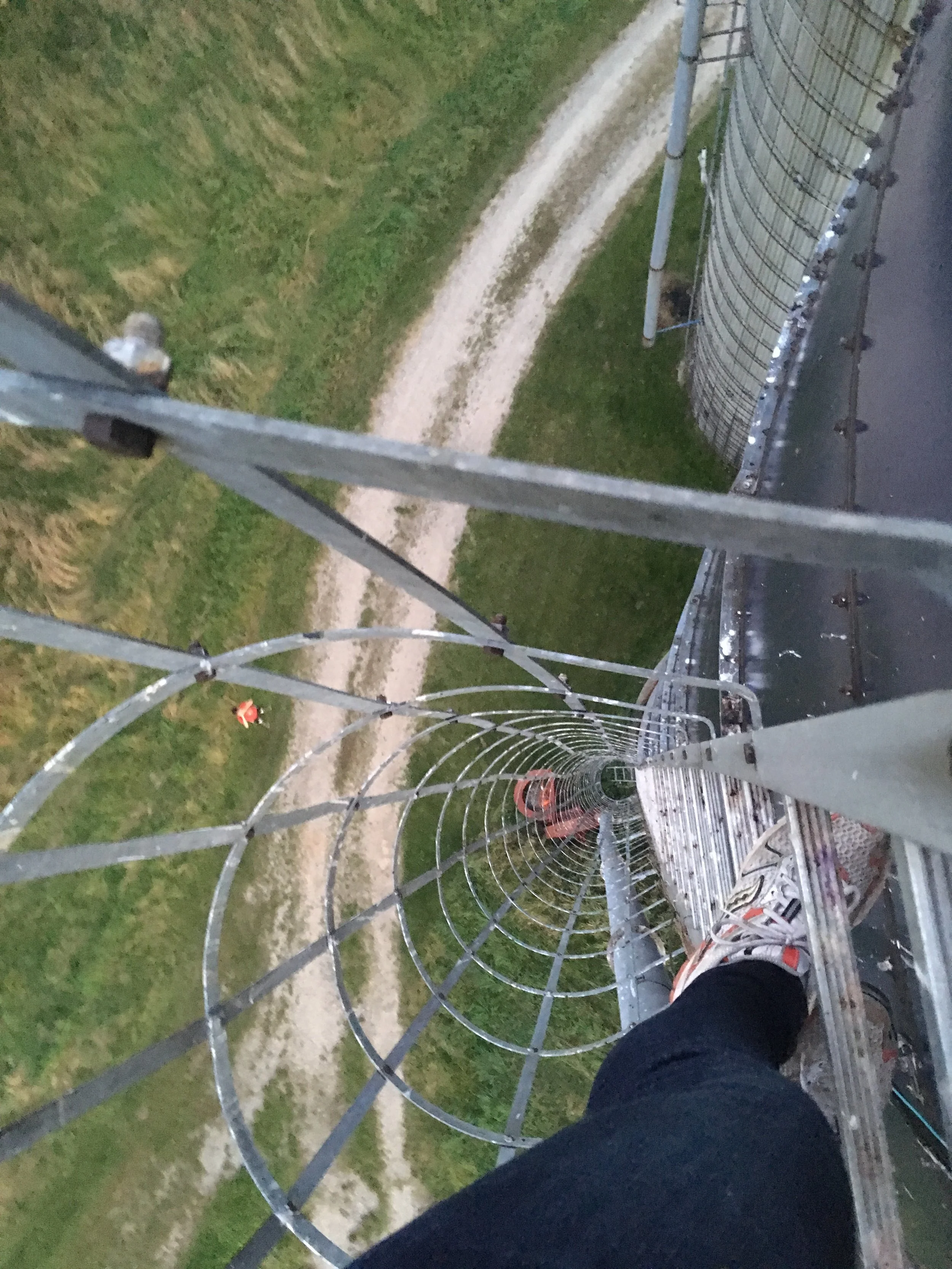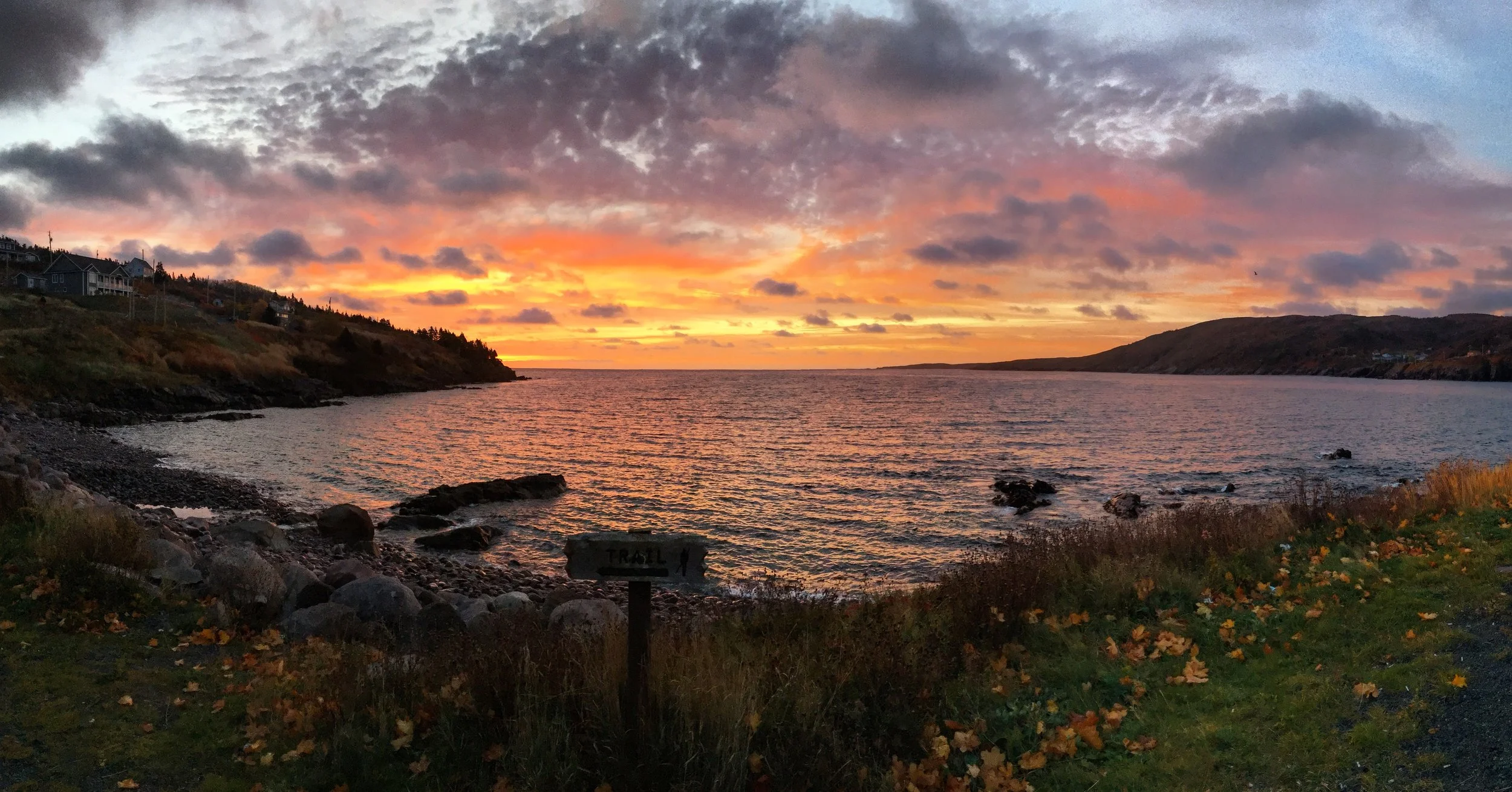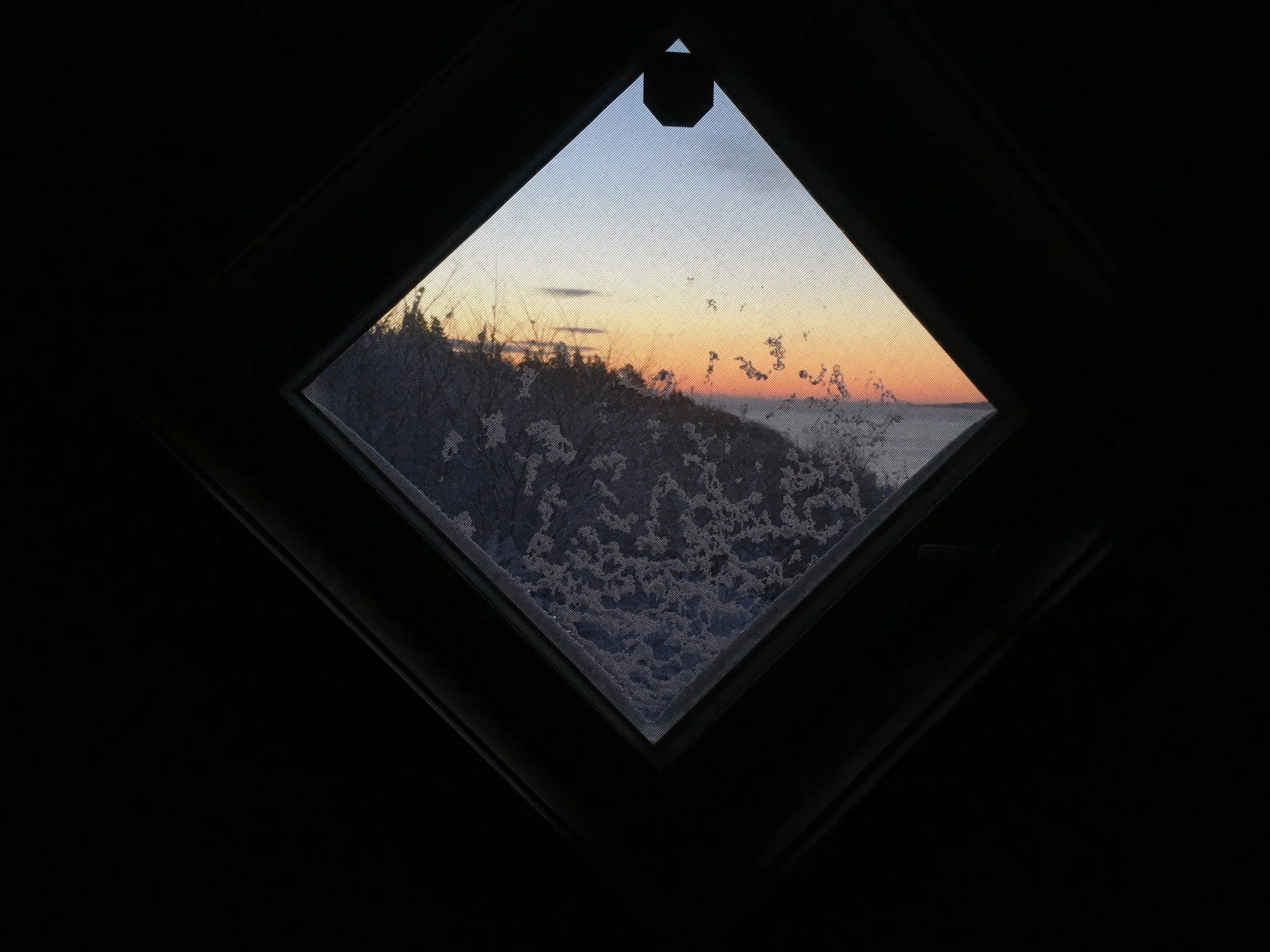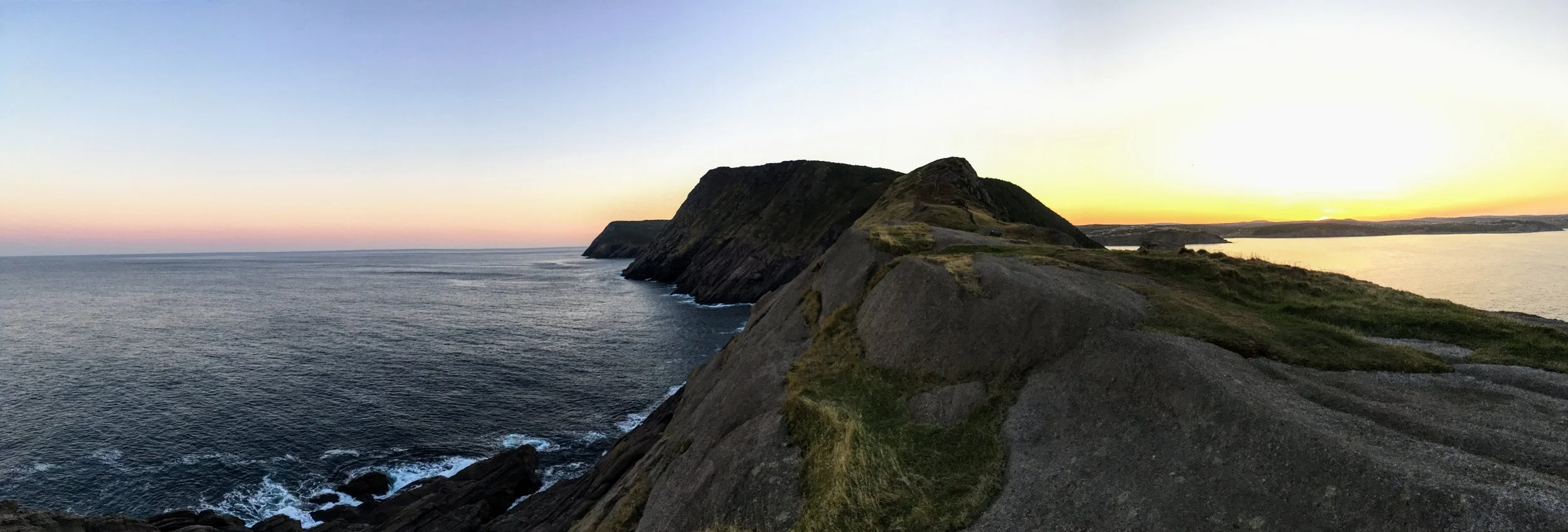It's been a beautiful October in Newfoundland. The sunrises have consistently put me behind in my morning routine because I linger with my coffee as I watch it peek up in the east (The most easterly point you can go in North America that happens to be my backyard.) But with each sunrise comes more memories.
Last fall I felt like a dead person walking. I look back on those days and wonder how in the world I survived. When the sun rose I would know it was beautiful, but it barely registered. When the leaves tumbled to the ground, I thought about walking off sidewalks. My brain was foggy and I would hide in bed. Driving was scary and I often wondered if I should call someone to drive me.
At the time, I thought I was doing this really amazing thing by not telling people. I was in desperate need of help, and even though people might not have guessed, I wasn't doing nearly as great as I was telling them.
It's a touchy subject when talking about people who need help. For me, I think there was a sense of pride about not getting it for myself. I thought it made me stronger. Looking back, I think it took much more strength for me to finally reach out and take it. However, I completely understand why people think they can struggle through it. The fear of being seen differently and as weak is SO scary.
I knew I could no longer do it on my own, but I was so scared to ask for it. I was terrified about the unknown. Would medication change me? What if I gained 50 pounds? Would I become flat and boring? What if it didn't work and my life was always miserable? I thought about those questions day in and day out.
I didn't understand just how numb I was until months later, but I know now that it was a true miracle from beginning to end that worse things didn't happen.
A month ago, I went back to my old writings and read my thoughts from those days. The more I read, the more it clicked that back then the unknown was more than I could handle. While yes, I was a dead person walking, I had managed to create a routine where most people didn't notice and I felt safe in that.
When I started to accept that I needed help, I researched everywhere. I wanted to know what I was in for. I needed the truth. And yes, I found blogs I related to and made me feel less alone, but in those initial days when I didn't know what was wrong with me, I had no idea what to expect. I decided to write this down in case someone wants to know what it was like.
If you're considering talking to someone-- this is my experience. Yours might be much different, but this is my truth.
It will never be as bad as it was when you didn't know what was wrong with you
Dr. Reese told me that right after she diagnosed me. "You will never be this low again," she said. "Before this moment you had no idea what was going on with you, and from now on you won't be in the dark. You will have hope."
She was right. I used to be so scared of myself. I constantly worried about my brain and what I would say. I was a pent up mess who always was on the brink of breaking down into a bundle of screams. I felt hopeless and like death would be welcome, because I didn't want whatever was happening my head to be the reality. Now, when I go back to that place of hopelessness, I know that it will end. When I'm laying in bed unable to move, I try to tell myself to just wait it out because in a few days I will be able to see beyond the fog. I hold onto that even in the darkest moments.
It will be a fight that you have with yourself every single day of your life.
This is one of the most frustrating things I have to accept now. Recently, I had a really good day. I didn't feel worried about a high or low. I felt normal. It's a really wonderful feeling to know what that looks like now, and it makes me want to tell the entire world when it happens.
I drove the road I avoided for an entire year, and stood at the lookout that I used to dream about driving off. I took in the smell of the ocean, the crashing waves, and the bend in the road that used to be my biggest fear. I wanted to shout with joy.
But as I got in the car and drove away, I knew that it meant work. Stable is something I can't take for granted. So the following day, I hauled out my running shoes and headed to Quidi Vidi where my feet pounded the gravel.
It doesn't matter how I'm doing-- it's a constant battle of monitoring where I am and how I should handle it. It's exhausting and it's a lot of work--but it's ultimately worth it.
You will notice the comments people make about mental health, but try not to become angry with them
The word bipolar is rarely, if ever, used in a good light. After I was diagnosed with Type 2, I noticed it everywhere. People casually calling people who were moody "bipolar" suddenly hit me all the time. When someone with mental health problems was called crazy, I wondered if I was called that behind my back too. When people say that something will "send them to the Waterford," I always cringe on the inside. However, I've come to accept that it's almost never said with the intention to be mean. For years those words were common and you can't suddenly change people's vocabulary. While I hope that one day it changes, I've chose not get angry about it because I know it's not meant to hurt me.
Learn the signs of going into a high or low
Over and over the professionals would tell me to keep a journal. I've done a bunch of different methods of tracking my behaviour, and it's been helpful. One thing that I've noticed about going into depression is that I get very very paranoid. I never used to realize that it was a sign of spiraling, so for days on end I would be convinced that coworkers, friends, and family hated me. I would always worry about annoying them. So now, when that starts happening, I make sure to argue with my brain. I remind myself that while I may be annoying sometimes, they probably aren't all sitting there wishing I'd never been hired or even born.
And as for a high, I have a tendency to be funnier, wittier, and more enjoyable to be around. I subdue myself a little bit because especially when meeting new friends, I know they will meet a slightly quieter person later on. I used to go out with friends and be the life of the party. I'd joke, laugh, and suggest fun things to do. So when I would go quiet a little later on, they would constantly ask me what was wrong. Half the time, I didn't know how to answer that. Now I have an answer, but it still happens.
You will forgive a lot of people and find healing
This one is huge. For about 10 years I have struggled with anger and blame. I've gone over most of my relationships and realized that people probably didn't abandon me-- I pushed them away. The people on my school bus didn't know I would have nightmares and cry about how they treated me. While they may not have been nice, they had no idea it would affect my brain as much as it did. I didn't realize that they probably thought it was just a joke.
My relationships were a combination of fault. They couldn't have know just how much their words would mess me up. When people made comments about me sitting in the van at social functions, they had no idea it was how I coped with the overwhelming feeling that I was drowning and on the verge of panic.
All the hurt probably wasn't intentional. While mistakes were made on both sides-- neither knew that they were affecting me so much, and I didn't know why it bothered me for years and years.
I have forgiven and moved on from so much more than I thought possible. It's one of those things I will forever be the most grateful for.
Be sure that you want to tell people about it, and wait even longer after that
I wrote the blog post about my diagnosis too soon. I thought I was ready, but I wasn't ready to talk about it with people one on one. I'm so, so, thankful for the people who reached out, but writing about it was different than talking about it. I was overwhelmed and unsure of what to say to people who wanted to help. I also wished some people who found out didn't know. I'm still working on that. There are times I want to discuss it and bring awareness to what Type 2 is, because I wish I'd known, but sometimes there is a sinking feeling in the pit of my stomach about people knowing, too. The fear of rejection and judgment eats me up.
It'd be amazing if I didn't worry so much about what people thought, but I do. Worrying about how it will affect my job, relationships, and acceptance as a person is probably always going to be there.
The medication will have side effects, but it will be a thousand times worth it
I have pretty bad headaches, awful nightmares, and often wake up drenched in sweat. However, I know that the alternative is always wanting to die, dizziness for weeks on end, and constant fear of facing daily life.
My medication has worked miracles. I used to look at the bottle each morning and curse it. Now I swallow it with a thankfulness I never dreamed would happen.
Medication won't cure you
I think a lot of people expected this, and I thought maybe that would happen. The truth is that it takes a lot more work than waking up and swallowing a pill each morning. It takes mental energy, acceptance, and often exercise. It's a combination of different kinds of work that I need to be willing to do every single day of my life. My heart breaks for people who are caught in the vicious cycle of wanting to change, but battling getting out of bed.
Your life will suddenly make sense
For fifteen years I couldn't figure out why I was different from everybody else. People would reassure me that I was normal, but my brain said otherwise. I didn't understand why I felt so deeply, why I would get so excitable, or why things would depress me for weeks and months on end. I'd keep trying to fit, and I always failed.
I'd look back on events in my life and wrack my brain for answers. But when I was told I had Type 2, I went back over my life and it made almost every single one of those difficult periods make sense. It explained my grad year where my marks skyrocketed while working 30 hour weeks. It explained the deep depression that hit me when I was 20 that lasted for months. It explained the insane number of tasks at work I could do one month, and then struggle to match the next.
It explained why I moved to Newfoundland. It explained why I couldn't let go. And it explained why people never understood.
It was like a light was turned on that explained a lifetime of darkness.
Some people can't handle talking about it, but it doesn't make them bad friends or family
This one was a hard one to accept, but now I understand. Talking about mental health is draining for some people and hard to comprehend. I had a few people tell me that they couldn't handle discussing it with me. At first it hurt, but the more I think about it, the more I understand them. Someone on Twitter once said something that made a lot of sense--If someone is fighting their own battle, it can be hard to talk about someone else's. We never know what someone is battling.
Don't ever let it be an excuse, and take full responsibility for your actions even if you're in a high or low
I know this is something I've repeated several times, but it's what I have to keep reminding myself. When I was first diagnosed there was someone in my town who was on trial for some pretty horrible things, and they got off because of their diagnosis of Bipolar. I was in the Costco parking lot when I found out. I got in the car and cried. I hated the thought of going back to my home and people thinking I was capable of the same things.
I've made a lot of really terrible choices in my highs and lows. I have a tendency to push people away. While I might be sick in those times, I still shouldn't do it. I used to spend a lot of money, but I don't think it's an excuse because I still knew that it would put me in debt.
I know bipolar can make people do things they would never normally do, but with me it can't be an excuse. I don't lose touch with reality with Type 2, and because of that I still know right from wrong. I want to be held accountable. I've been tempted, very tempted, to use it as an excuse sometimes, and I probably have-- but it's something I feel pretty strongly about.
You will lose some of your creativity
This has been brutal. I find it very difficult to write things that are truly good or unique anymore. I believe it's because I'm more stable. I still crave getting words out and taking beautiful pictures, but it's harder for me to express my thoughts. It doesn't flow out as easily. One of my friends used to tell me that when I had an idea I had to get it out ASAP because it would leave. She was right, and I think it was because of my moods. It's hard knowing that some of my work that people loved might never come back.
I know this isn't true for everyone. Many people have written about how it's actually helped, but it's not true for me.
Hopefully one day I will be more okay with this.
Everyone will try and tell you about what they think you should do to cure yourself
I can't begin to tell you the number of suggestions that I've been given-- Certain foods, vitamins, meditation, praying, reading or simply "being positive." At first it drove me crazy. But I came to think of it as people trying to say they cared, even if it was sometimes offensive.
Learn the little things that help
A coffee in the morning, thinking of things I like about my day, a good glass of wine, running around the lake, taking pictures, and having an amazing conversation. Snuggling with the kitty, a walk to the point, and going to the waterShed. There's a million more things, but learning what will bring even the smallest change does wonders when you're scrambling to fight the fog that can rush in.
So many of the people in my life are patient and amazing
I could go on forever, but for those who have stuck by me through every single up and down, I can't even believe it. I love them and I 100% do not deserve them. It blows my mind that they have put up with me.
I continue to associate sunrises with hope. I started noticing them right around the time I was in the middle of hospital and doctor's visits, and as the time ticks by and the days and weeks slip into November, I am increasingly thankful.
Would I have started the medication had I known back then? I like to think so.
My doctor told me something that's always stuck with me. "If it works for someone, then I'm not going to say it doesn't work." I would never tell someone that they have to start medication. I can tell them it changed my life, but that's only for me.
But I can tell them that reaching out and asking for help is a GOOD and STRONG thing to do. It doesn't mean you are weak. It means you want to be a better person. You might be fooling the entire world, but having a clear brain and ACTUALLY being better is like getting a second chance on life.
I started 26 at rock bottom. I thought it would be my worst year and that I might not survive it. What actually happened is that I started fighting back. I forgave more people than I can count. I found out what normal is. I faced countless fears. I cried. I crashed. I struggled with acceptance. I was thankful for this life that's been given to me.
A year later, I started 27 HAPPY to be on this earth. Not happy for one day. But happy that I'm 27 and have a future. Can you even believe that?! Because I hardly can. But it's real. It's my life.
In January I wrote that I wanted to know what it was like to be better. Now I know.
I am one of the most fortunate people alive.











